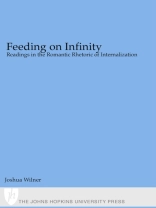What ‘internalization’ means for writers and critics of Romanticism, including Rousseau, Wordsworth, De Quincey, Baudelaire, Freud, Benjamin, and Sedgwick
Winner of the American Conference on Romanticism»s Jean Pierre Barricelli Book Prize
‘Although defining Romanticism is a standing problem for literary history, some notion of internalization at the level of cultural tradition has recurrently been proposed as the solution to that problem . . . In this debate the notion of internalization tends to be handled . . . as a known quantity, whereas I am arguing that the notion itself remains obscure and thus that the problem of internalization and the problem of Romanticism may indeed, with respect to the discourse of literary history, be closely intertwined’—from Feeding on Infinity
Notions of ‘internalization’ play an important role in many contemporary fields of discourse, including literary history and theory, psychoanalysis, ideological critique, and learning theory in the social sciences. Indeed, the term ‘internalization’ is pervasive and seems to answer a shared need of expression to such an extent that it is one of those technical words that has found its way into everyday use. But the meaning of this term and the continuities and discontinuities at work in its varied deployment have, for the most part, gone unanalyzed.
In Feeding on Infinity, Joshua Wilner explores the power and limits of the discourse of internalization through the close reading of a variety of texts drawn from the Romantic tradition, a tradition which is both source for and oftentimes object of this discourse. Through the study of writers including Rousseau, Wordsworth, De Quincey, Baudelaire, Freud, Benjamin, and Sedgwick, he seeks to deepen our understanding of the problem of internalization, while situating its more or less explicit emergence as a problem in relation to the history of, in Gertrude Stein»s phrase, ‘patriarchal poetics.’
Through patient attention to the transformations of rhetorical structures of representation and address performed by these works and to the frequent condensation of these transformations in figures of eating and drinking, Feeding on Infinity makes available to inquiry a surprisingly rich and largely unexplored network of connections within the ‘long’ Romantic tradition. At the same time, it forges new links between deconstructive reading practices, psychoanalysis, and recent work in gender studies.











